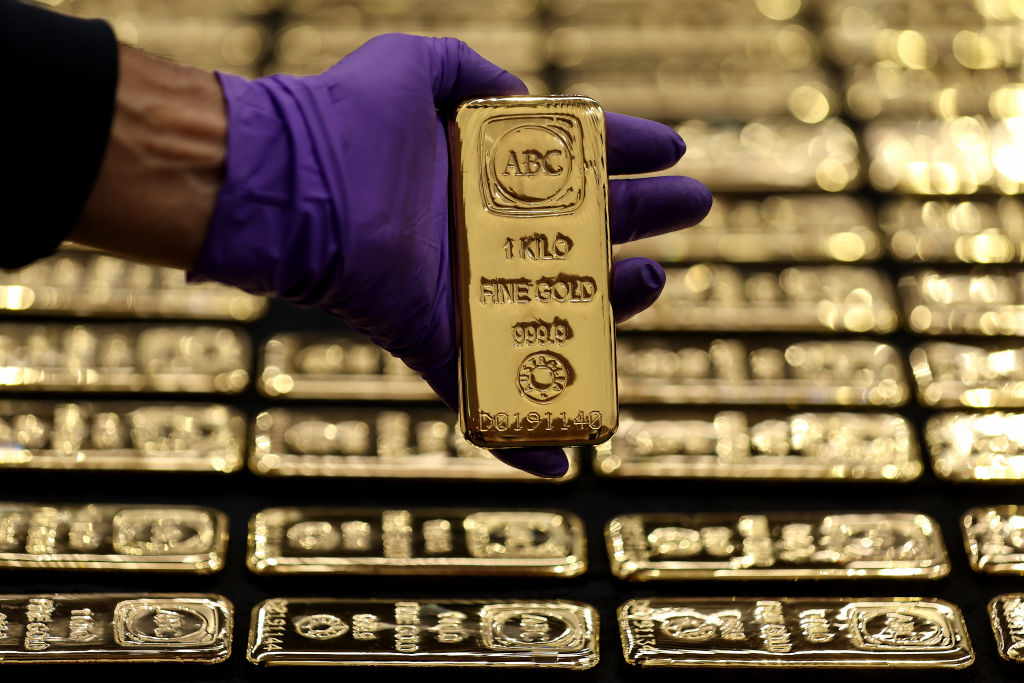Gold prices hit a new record high yesterday afternoon, with its spot price of $2,531.60 (£1,943.83) an ounce up 1% on the day. This means that a standard bar of gold — weighing in at 400 troy ounces (12.4kg) — is now worth more than $1 million. While this is a somewhat arbitrary milestone, it reflects very deep changes in the gold market.
In the early Seventies, when the US dollar was taken off the gold standard, the precious metal was trading at just over $100 an ounce. At the end of that decade and the beginning of the next, amid soaring inflation, there was a spike in the price of gold, which reached over $820 an ounce in late 1980. While the price came down shortly after this, it remained above its Seventies levels, hovering around $300-$400 until the mid-2000s.
It was after the 2008 financial crisis, when central banks turned to quantitative easing (QE), that gold prices began to rally in earnest. Gold first broke the $1,800-an-ounce mark towards the end of 2011 when the Eurozone was experiencing a sovereign debt crisis and the QE programmes were in full swing. In the post-2008 world, gold became anchored to inflation expectations, tracking yields on inflation-protected Treasuries (TIPS). Gold prices in the period reflected where investors thought inflation was headed.
But the recent explosion in gold prices appears to have little to do with inflation forecasting. Indeed, we first saw a run-up in the gold price as inflation was rising and now the value continues to increase even though inflation is widely thought to be falling and central banks are considering easing. This suggests that gold has become untethered to inflation expectations, and that something or someone else is driving the price.
That something or someone appears to be central banks, which are buying gold at a record pace. The main buyers are the Chinese, Indian and Turkish central banks, yet Russia anticipated this trend a decade ago. Moscow went through two phases of buying gold, first in the wake of the 2008 financial crisis. In the first quarter of that year, the Russian central bank held around 457 tonnes of gold; by 2014, this had risen to 1,040 tonnes.
But it was after the 2014 annexation of Crimea, which precipitated the first wave of sanctions on the country, that Russian gold-buying really started. By the first quarter of 2020, Russian gold reserves had risen to 2,300 tonnes; having purchased around 97 tonnes a year in its initial phase of gold buying, in its second the country was buying around 210 tonnes a year.
It was the second round of Russian sanctions, imposed in early 2022 in response to the invasion of Ukraine, that spurred other central banks to get in on the action. These sanctions, which included the freezing of Russian foreign exchange reserves, awakened other countries to the fact that the US dollar could be weaponised against foreign nations. The ensuing scramble has involved other central banks trying to catch up with Russia to diversify their reserves through gold purchases, creating windfall gains for Moscow. Russia’s 2,300-tonne gold reserve was worth around $136 billion in 2020 — and cost far less to buy — but today it is worth around $184 billion.
How much higher can the gold price go? These central banks appear to be price-insensitive buyers: they are not buying the metal because they think it is cheap. Instead, they are buying it because they feel they need it, and the price increases we are witnessing haven’t deterred them. This means that, in theory at least, the price can continue to rise until these central banks have satiated their appetite for gold.











Join the discussion
Join like minded readers that support our journalism by becoming a paid subscriber
To join the discussion in the comments, become a paid subscriber.
Join like minded readers that support our journalism, read unlimited articles and enjoy other subscriber-only benefits.
Subscribe